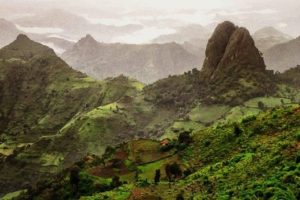
BY ZEKARIAS WOLDEMARIAM
This year the worlds Earth Day will be commemorated with the theme “Investing in our Planet”. So far the investment human beings have been making used to focus on what they can benefit out of the earth, not the reverse. Indeed the Earth deserves to obtain a lot from the knowledge and technological advancement of humans in return to its unmatched, irreplaceable role for the existence of life.
However, the payback by humans for earth was absolutely contradictory to its positive role. What is hurting the earth is what we are doing on it to make a living. We work for ourselves. Not for the earth that carries us, that provides us.
But our action is just like the man who cut of the branch where he is sitting on. The actions of humans towards the earth so far has proved to be suicidal and this has to significantly change. Otherwise, the earth will also continue to respond negatively which is a choice that humans never make.
Therefore, this situation has to change and human beings should start to think what they can provide to maintain and nurture the earth rather than what they can benefit from it. Without exaggeration the earth could be dubbed as a generous provider of wealth and all the necessary means of living for human beings. Starting of the time when humans
lived on it, the earth has endowed humans with abundant resources for existence. It gave humans fresh air, water, soil, forest, minerals … etc. Unfortunately humans have turned ruthless and unwise in paying back the favor to earth which they have exploited and benefited a lot from. Ecosystems, the fabric of life on which we all depend, are declining rapidly because of human actions. But there is still time to save them.
According to Natural History Museum (NHM), Human pressure on nature has soared since the 1970s. We have been using more and more natural resources, and this has come at a cost. If we lose large portions of the natural world, human quality of life will be severely reduced and the lives of future generations will be threatened unless effective action is taken.
Over the last 50 years, nature’s capacity to support us has plummeted. Air and water quality are reducing, soils are depleting, crops are short of pollinators, and coasts are less protected from storms. One of the major way humans are causing damage on the planet is their land-use. Humans may destroy natural landscapes as they mine resources and urbanize areas.
This is detrimental, as it displaces residing species, reducing available habitats and food sources. Pollution of water and air is the other severe disaster unfolding on earth. Pollution can occur from the runoff or disposal of chemical substances, or from energy sources (noise and light pollution).
The way scientific community releasing genetically modified organisms on earth is also a threat to the ecosystem. Humans may unintentionally, or intentionally, introduce a non-native species into an ecosystem. This can negatively affect an ecosystem because the introduced species may out compete native organisms and displace them.
The exponentially increasing number of population is also threatening the earth as it directly means the over exploitation of the natural resources. Humans consume large amounts of resources for their own needs. Some examples include the mining of natural resources like coal, the hunting and fishing of animals for food, and the clearing of forests for urbanization and wood use.
Extensive overuse of nonrenewable resources, like fossil fuels, can cause great harm to the environment. Recycling products made from nonrenewable resources (such as plastic, which is made from oil) is one way to reduce the negative impacts of this resource exploitation. In addition, the development and use of renewable resources, like solar or wind energy, can help decrease the harmful effects of resource exploitation.
We’ve been cutting down our rainforests like we have an unlimited supply of them. Earlier this year the Amazon rainforest lost 740 square kilometers of tree cover in just a month. That sort of reckless destruction has resulted in these forest regions growing warmer and drier, thus making them more prone to catching fire. Not to mention they’re then scrubbing less carbon dioxide from the air.
Rising temperatures also have a more direct impact. With just another degree rise, we can expect to see regular heat waves across the world, but particularly in heavily polluted countries like India and China. That means thousands more people will die each year, if not millions.
Yet the solutions for all the problems threatening the earth are still in the hands of humans, the sources of the problems. Many of the experts and authorities argue that even though the planet is facing the worst levels of the impacts of human unfair intervention and treatment, it is not yet late to take corrective actions and maintain the earth.
The all out efforts being coordinated by global bodies like the UN and many international organizations are good steps towards the solution. For this end the actions that are being taken should focus on how human being do their jobs with the benefit, maintenance and safety of the earth in mind, rather than what humans can get out of the earth. IT is when humans protect and safeguard the earth that they can best exploit it.
THE ETHIOPIAN HERALD TUESDAY 11 APRIL 2023





